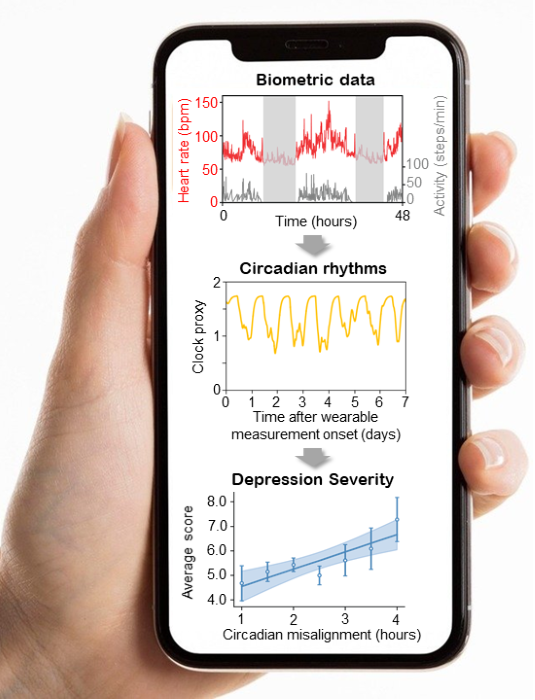Researchers from KAIST and the University of Michigan have developed a digital biomarker capable of predicting depression symptoms using data from wearable devices. This innovation could provide a non-invasive and cost-effective alternative to traditional medical tests like fMRI, offering new possibilities for mental health care.

Schematic diagram of the research results. Based on the biometric data collected by a smartwatch, a mathematical algorithm that solves the inverse problem to estimate the brain's circadian phase and sleep stages has been developed. This algorithm can estimate the degrees of circadian disruption, and these estimates can be used as the digital biomarkers to predict depression risks. Image Credit: Korea Advanced Institute of Science and Technology
The COVID-19 pandemic didn’t just impact physical health; it also fueled a global mental health crisis. Over one billion people worldwide now live with psychiatric conditions, with South Korea seeing an especially sharp rise in cases. In the past five years, the number of individuals diagnosed with clinical mental illnesses in Korea has increased by 37 %, reaching approximately 4.65 million.
Recognizing the need for better solutions, a joint research team from KAIST and the University of Michigan has developed a groundbreaking technology. By analyzing biometric data from wearable devices, this system can predict daily mood changes and assess the likelihood of developing depression symptoms.
The team developed a novel algorithm that processes activity and heart rate data from smartwatches to predict symptoms of depression, including sleep disturbances, appetite changes, and decreased concentration in shift workers.
According to the World Health Organization (WHO), a promising new approach to mental health treatment involves targeting the sleep and circadian timekeeping system located in the hypothalamus. This system plays a critical role in regulating impulsivity, emotional responses, decision-making, and overall mood.
However, accurately measuring circadian rhythms and sleep states poses significant challenges. Traditional methods involve drawing blood or saliva every 30 minutes throughout the night to monitor changes in melatonin levels, as well as conducting polysomnography (PSG). These procedures typically require hospitalization, making them impractical for most psychiatric patients who rely on outpatient care. Additionally, the high cost of PSG, approximately $1000 per session, places these tests out of reach for socially disadvantaged populations.
Wearable devices offer a potential solution by enabling real-time collection of biometric data such as heart rate, body temperature, and activity levels without the need for hospitalization. However, current devices provide only indirect insights into critical biomarkers, such as the phase of the circadian clock, limiting their utility for medical purposes.
To address this gap, a joint research team has developed an innovative filtering technology that can accurately estimate the circadian clock’s phase. This technology analyzes heart rate and activity data collected from smartwatches, creating a digital twin that precisely represents the brain’s circadian rhythm. This breakthrough enables the detection of circadian rhythm disruptions, providing a valuable tool for assessing mental health risks and improving treatment accessibility.
The idea of using a digital twin of the circadian clock to predict depression symptoms was put to the test with the help of Professor Srijan Sen from the Michigan Neuroscience Institute and Professor Amy Bohnert from the University of Michigan’s Department of Psychiatry.
In a study involving about 800 shift workers, the team showed just how effective this technology can be. By analyzing disruptions in circadian rhythms with a digital biomarker, they were able to predict not only how someone might feel the next day but also identify six key symptoms of depression. These included sleep issues, changes in appetite, trouble focusing, and even suicidal thoughts. This research shows how wearable tech could become a game-changer for early mental health support and monitoring.
It is very meaningful to be able to conduct research that provides a clue for ways to apply wearable biometric data using mathematics that have not previously been utilized for actual disease management. We expect that this research will be able to present continuous and non-invasive mental health monitoring technology. This is expected to present a new paradigm for mental health care. By resolving some of the major problems socially disadvantaged people may face in current treatment practices, they may be able to take more active steps when experiencing symptoms of depression, such as seeking counsel before things get out of hand.
Dae Wook Kim, Study Joint First Author, Corresponding Author and Professor, Department of Brain and Cognitive Sciences, Korea Advanced Institute of Science and Technology
Journal Reference:
Lee, M. P., et. al. (2024) The real-world association between digital markers of circadian disruption and mental health risks. npj Digital Medicine. doi.org/110.1038/s41746-024-01348-6